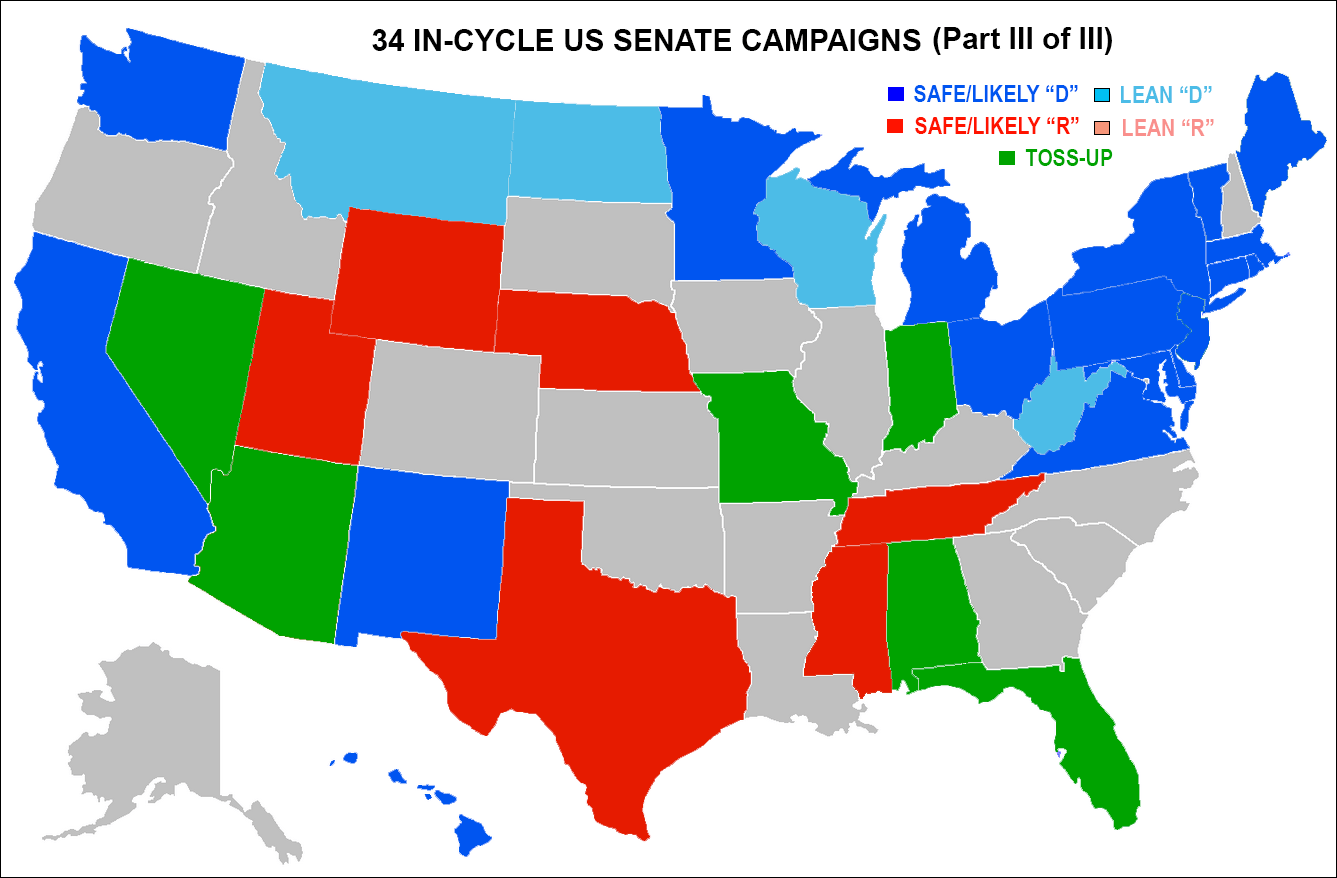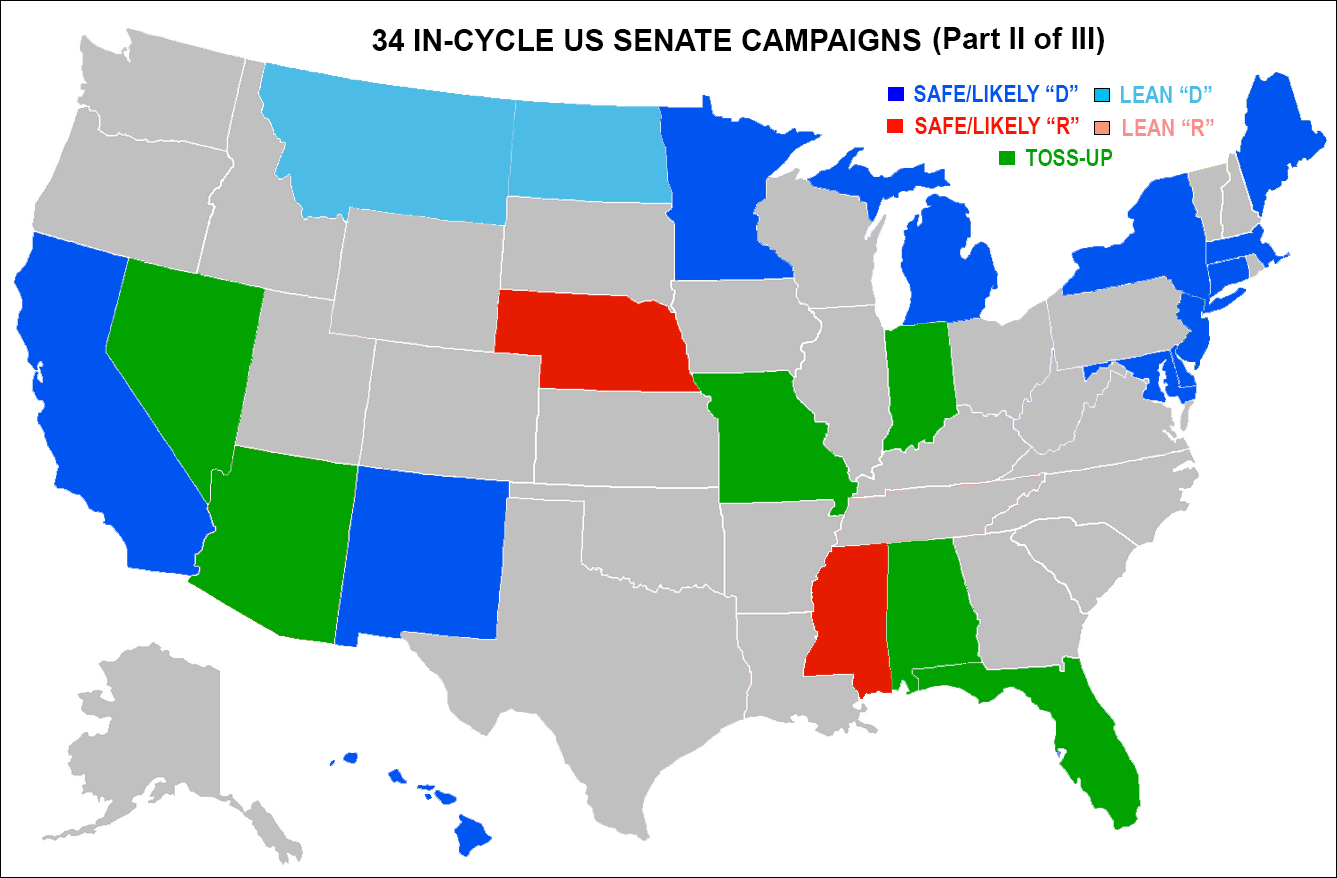
By Jim Ellis
Nov. 27, 2017 — Wrapping up our holiday recap of the 2018 Senate races — we finish our coverage with Ohio through Wyoming.
• Ohio: State Treasurer Josh Mandel (R), who held Sen. Sherrod Brown (D) to a 51-45 percent win in 2012 during the same election when President Obama led the ticket in Ohio, returns for a re-match next year. Mandel must first get past wealthy investment banker Michael Gibbons in the Republican primary, but appears well positioned to do so. A Brown-Mandel race could again develop into a major campaign, as the Republican’s ability to run a strong statewide race has improved during the last six years. In 2014, Mandel was re-elected state Treasurer with 59 percent of the vote.
Rating: Lean D
• Pennsylvania: Sen. Bob Casey Jr. (D) runs for a third term after seeing President Trump and fellow Sen. Pat Toomey (R) win close Keystone State contests last year. It is conceivable that Sen. Casey will be in a tighter re-election campaign cycle than five years ago when he scored a 54-45 percent victory. Since Rep. Lou Barletta (R-Hazelton) entered the race, the GOP Senate candidate field has decreased with two contenders, state Rep. Rick Saccone (R-Elizabeth/Jefferson Hills) and businessman Jeff Bartos, departing to run for other offices. The general election could be competitive, but Rep. Barletta may have a difficult time re-constructing President Trump’s winning coalition. The congressman may find a very rough going in the Philadelphia suburbs as did President Trump, which means developing a winning statewide base becomes highly challenging. Like the president posted, Rep. Barletta will need a record rural turnout in order to win.
Rating: Likely/Lean D
• Rhode Island: Sen. Sheldon Whitehouse (D) appears poised for an easy re-election run next year, particularly with Republican attention focused upon a much more competitive governor’s race.
Rating: Safe D
• Tennessee: Sen. Bob Corker (R) is retiring after two terms, but Republicans are still in strong position to hold the seat. Democrats are attempting to recruit former Gov. Phil Bredesen, but he is not likely to become a candidate even though saying a decision about running will be made shortly. Republicans will likely feature a GOP primary between Rep. Marsha Blackburn (R-Brentwood) and former two-term Rep. Stephen Fincher (R-Crockett County) that will be very competitive in early August, but sure to produce a strong general election contender.
Rating: Likely R, and Safe R if Bredesen does not run.
• Texas: Though eventual Democratic nominee Rep. Beto O’Rourke (D-El Paso) will be able to raise a large amount of national money, he will be no match for Sen. Ted Cruz (R), who is seeking his second term. O’Rourke is a capable candidate who can wage a respectable campaign, but Texas voting history and Cruz’s strength within the Republican base will still yield him a victory at least in high single-digits.
Rating: Likely R
• Utah: Two major questions dominate this campaign: will Sen. Orrin Hatch (R) seek an eighth term, and if not, does former presidential nominee Mitt Romney come forward to replace him. Sen. Hatch continues to say he plans on running, but always leaves the retirement door open particularly if Romney says he will run. Either way, the seat remains in the Republican column, as Utah Democrats are too weak to field a strong statewide candidate. It is probable that the GOP dynamic will not crystallize until well after the first of next year.
Rating: Safe R
• Vermont: Sen. Bernie Sanders will again appear on the Vermont ballot as an Independent even though he was a major contender for the Democratic presidential nomination. Regardless of his party designation, he is safe for re-election in his small state, which likely features the most liberal constituency in the country.
Rating: Safe I
• Virginia: Particularly after the Democrats’ strong showing in the 2017 Virginia gubernatorial election, Sen. Tim Kaine (D) is a heavy favorite for re-election as he seeks a second term on the heels of losing as the Democrats’ Vice Presidential nominee. At this point, controversial Republican Corey Stewart, the Prince William County Board chairman who ran strongly in the GOP gubernatorial primary, is Sen. Kaine’s leading opponent but Republicans desire a more viable candidate. Speculation is increasing that Rep. Barbara Comstock (R-McLean) might run especially with the Democrats turning in such a strong performance in her Northern Virginia district earlier this month. So far, there is no indication that Rep. Comstock will reverse course to enter the statewide contest, however.
Rating: Likely/Safe D
• Washington: Sen. Maria Cantwell (D) has yet to even draw an opponent as she prepares a run for a fourth term.
Rating: Safe D
• West Virginia: A major Republican primary is brewing between Attorney General Patrick Morrisey and Rep. Evan Jenkins (R-Huntington), with the winner facing Sen. Joe Manchin (D) next fall. Though West Virginia has moved decidedly to the right since the turn of the century and President Trump posted 69 percent here last November, Sen. Manchin remains at least a slight favorite for re-election. A minor Democratic primary challenge from the left should help the senator continue better craft his centrist image.
Rating: Lean D
• Wisconsin: Though Republicans have seen their fortunes greatly increase here during the past seven years, the field challenging Sen. Tammy Baldwin (D) has been slow to develop. Businessman Kevin Nicholson (R) is active and receiving heavy support from outside financial sources, but the Republican conservative base is looking elsewhere. State Sen. Leah Vukmir (R-Brookfield) is in the race and figures to be a significant candidate. With the Wisconsin primary not occurring until August, Sen. Baldwin has the luxury of having a long time to prepare for what should be an active general election campaign cycle.
Rating: Lean D
• Wyoming: The big question surrounds whether Sen. John Barrasso draws a GOP primary challenge from Blackwater Security firm founder and international businessman Erik Prince, brother of US Education Secretary Betsy DeVos, or mega-conservative donor Foster Friess. Chances are neither will run, meaning Sen. Barrasso has little trouble in securing a second full term.
Rating: Safe R







